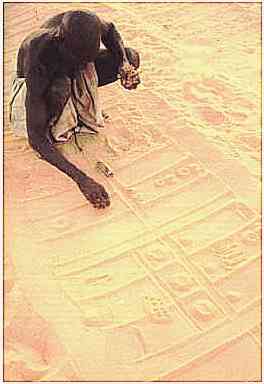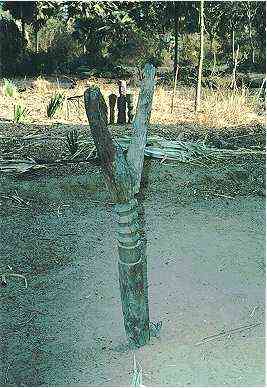
‘AN INCOMPREHENSIBLE MIRACLE’
Central African clerical intellectualism versus African historic religion: A close reading of Valentin Mudimbe’s Tales of Faith (full text)
Part 0. Introduction and links to other parts
Wim van Binsbergen

 |
‘AN INCOMPREHENSIBLE MIRACLE’ Central African clerical intellectualism versus African historic religion: A close reading of Valentin Mudimbe’s Tales of Faith (full text) Part 0. Introduction and links to other parts Wim van Binsbergen |
 |
This
is the full argument, a shortened version (25% only) of which
was presented at SOAS, 1st February 2001-02-01; click here for the shorter version;
or for the downloadable
shorter TXT version
Wim
van Binsbergen[1]
‘Tales
of Faith[2]
is also, and perhaps mainly, about an
incomprehensible miracle — that is, an extraordinary event
in the world. These lectures constitute an invitation to meditate
on my composite narrative, which contemplates difficult
statements that are contradictory in their effects and, in any
case, unbelievable for the agnostic that I am.’[3]
to
Patricia Saegerman, my beloved wife, born in Stanleyville,
Belgian Congo
The present paper was first delivered as the opening lecture in a series around Valentin Mudimbe, organised by Louis Brenner and Kay Kresse. Born in 1941 in the former Belgian Congo (subsequently Zaire and Congo), and now holding appointments at Stanford and Duke in the United States, as well as being Chair of the Board of the International Africa Institute, London, Mudimbe is one of the leading Africanist scholars of our time. His large oeuvre spans the fields of belles lettres (poetry and novels), philosophical essays, classical philology, the history of ideas, and edited works assessing the state of the art in African studies especially philosophy and anthropology. In Africanist circles he is probably best known for two books which trace the political and intellectual trajectory of concepts of Africa from Antiquity to the late twentieth century: The invention of Africa, and The idea of Africa.[4] There is no way in which, in the scope of the present argument, I can begin to do justice to what is clearly one of the great creative cosmopolitan minds, and one of the great intellectual and literary oeuvres, of our times. I have to substantially narrow down the scope of my argument, and I will do so on the basis of a number of related considerations. In this opening seminar, I think it is fair to situate Mudimbe in a particular social and intellectual context, and this is not difficult since his publications abound with salient autobiographical detail — not to say that his entire oeuvre may be read as a sustained attempt at autobiographical self-definition.[5] One of his latest books, Tales of faith (1997) happens to be an intellectual and spiritual autobiography disguised as a detached history of ideas of Central African intellectuals and their work and aftermath in the twentieth century:
‘Here, in concluding what is more a reflection on myself than strict research on African representations of Tales of Faith, I discover that I personally witness to these tales. The fact that I might not believe in God or in some kind of divine spirit has not prevented me from facing with sympathy the complexity of their fate and modalities of their cultural appropriations. In fact, the language I speak, the phenomena I comment upon, and the stories I have chosen to share in these lectures on conversion are, indeed, not only unthinkable outside of a space circumscribed by African elements but also well determined by anthropology and the colonial saga, as well as the practices and missionizing of Islam and Christianity. Thus, Tales of faith is about any post-colonial individual.’ [6]
The study of Central African religion has for decades been my main contribution to African studies, and has brought me in contact with Louis Brenner, my host today. Moreover, Tales of Faith was originally delivered as the Louis H. Jordan lectures at the School of Oriental and African Studies in 1994, so that this specific argument by Mudimbe may still have considerable resonance in this room by its own original impetus. I will therefore concentrate on Tales of faith, but connecting as much as possible to the rest of Mudimbe’s work, and to his person to the extent this transpires in the published texts. I will be very critical, not out of lack of respect and admiration, but because the fundamental issues of Africa and of African studies today manifest themselves around Mudimbe as a central and emblematic figure, and we need to bring out those issues. After discussing Mudimbe’s surprising methods I shall pinpoint what Tales of faith is about (the adventure of clerical intellectualism in Central Africa during the twentieth century), what metacontents it contains (homelessness as Mudimbe’s central predicament), and what all this means for the practice and the study of African historic religion,[7] the uninvited guest of Tales of faith and of Mudimbe’s work in general. This gives me the opportunity to articulate and substantiate what I have wanted to say about Mudimbe’s work for a long time. I will also take the opportunity of comparing his itinerary with my own, and our two paths will turn out to have been amazingly parallel even if they appear to have ended in opposite destinations.
Proceed to:
Part
1. Mudimbe's
method
Part 2. Clerical
intellectualism in Central Africa
Part 3a. Mudimbe's homelessness: No African home,
Afrocentrism, death
Part 3b. Mudimbe's homelessness: plurality of African
cultures; death; métissité
Part 4. Historic African religion
Part 5. Conclusion: Mudimbe's and van Binsbergen's
itineraries compared
[1] An earlier version of this paper was read at the School of Oriental and African Studies (SOAS), London, 1st February, 2001, as the opening lecture in a series of four, entitled ‘Reading Mudimbe’, organised by Louis Brenner and Kai Kresse. I am grateful to the organisers for creating a stimulating framework in which I could articulate and refine my thoughts about Mudimbe’s work; to the African Studies Centre, Leiden, and to SOAS for financing my trip to London, and to Patricia Saegerman, Louis Brenner, Kai Kresse, Richard Fardon, Graham Furniss, and other participants in the seminar for stimulating comments on an earlier draft.
[2] Mudimbe, V.Y., 1997, Tales of faith: Religion as political performance in Central Africa: Jordan Lectures 1993, London & Atlantic Highlands: Athlone Press.
[3] Tales, p. 202.
[4] Mudimbe, V.Y., 1988, The invention of Africa: Gnosis, philosophy, and the order of knowledge, Bloomington & Indianapolis: Indiana University Press/London: Currey; Mudimbe, V.Y., 1994, The idea of Africa, Bloomington, IN and London.
[5] Unfortunately, I have not yet been able to consult his explicitly autobiographical book: Mudimbe, V.Y., 1994, Le corps glorieux des mots et des choses, [ place: publisher ] .
[6] Tales, p. 198.
[7] I prefer the expression ‘African historic religion’ to alternatives such as ‘African traditional religion’ or ‘African religion’ tout court, in order to denote forms of religious expression which existed on the African continent more or less independently from and often prior to the penetration of such world religions as Islam and Christianity, and which have persisted in changed but recognisable form into the late nineteenth and twentieth centuries, when many of these forms were drawn into the orbit of professional outsider description. The word ‘traditional’ has been used in so many ideologically charged contexts as to have become meaningless; and Islam and Christianity have ranked among the religious forms of Africa ever since the first millennium of the common era.
Part 1.
Mudimbe's
method
Part 2. Clerical
intellectualism in Central Africa
Part 3a. Mudimbe's homelessness: No African home,
Afrocentrism, death
Part 3b. Mudimbe's homelessness: plurality of African
cultures; death; métissité
Part 4. Historic African religion
Part 5. Conclusion: Mudimbe's and van Binsbergen's
itineraries compared
| page last modified: 12-02-01 17:57:38 |  |
|||
 |